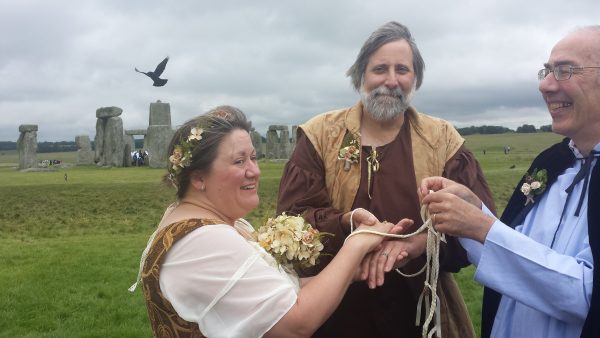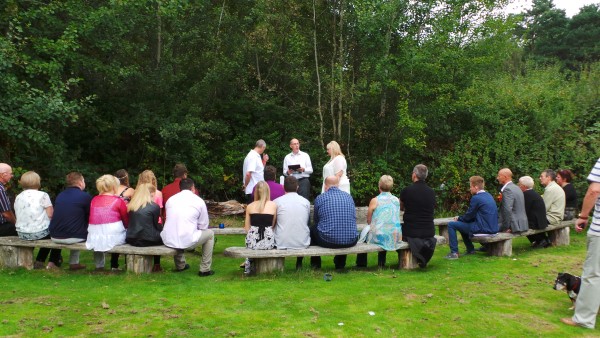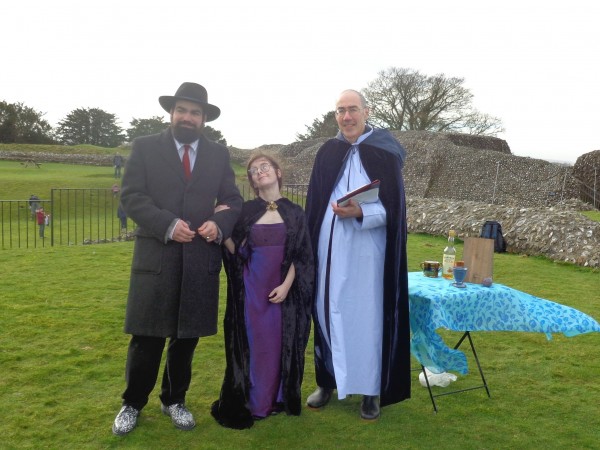by Michael | Nov 29, 2016 | Blog
Why should anyone consider holding less traditional receptions?
Remember that, nowadays, you are free, if you wish, to book a celebrant who can create and conduct a bespoke wedding ceremony for you. It may still be traditional, or partially so, but you have the choice. And it’s your big day.
In the same way, you don’t have to follow tradition for the reception, if you prefer not to.
To repeat, it’s your big day. Even if someone else is financing the reception, you should be part of the organising. Your wedding should be your once-in-a-lifetime event (well, not if you’re Zsa Zsa Gabor or Elisabeth Taylor, I realise!).
You should have the guests you want, but, in order to keep them happy, you may have to re-organise the event a bit.
Flexibility
Bearing in mind, the age-range of your guests, some changes could work to your advantage.
There are certain things that normally go together, but don’t have to stay that way. You expect toasts and speeches to come with dinner, probably near the end. But do they have to?
The cake-cutting doesn’t need to come at the end of the night (when people are tired or may have already gone home).
Just a thought (or two)
What about this? As soon as your guests have come in from the ceremony, have the first dance then. People are full of love and joy, and may be particularly receptive to this.
You could follow this by tossing the bouquet (if not already done).
Why not have the toasts after each of these activities?
When you sit down, the bride’s father can deliver his speech. Welcoming everyone at the beginning is logical. Moreover, he may well be nervous. This way, he can get the speech out of the way early on, and actually enjoy his meal!
Having the groom’s and Best Man’s speeches after the main course, but before dessert, is wise. People are no longer ravenous (so may concentrate!), but probably not rolling drunk either. The cake-cutting can take place after the speeches. That way, all the necessities will have been covered while people are still in the mood for them.
If you are working with a photographer/videographer or, indeed, a wedding planner, discuss all this in advance. They will be fine with it, as long as you don’t spring it all on them at the last moment! (One consideration is that if the photographer doesn’t have to stay till the end, because the main activities have already taken place, he may cost you a little less.)
Once all these activities have been dealt with, you too can relax, as there won’t be a schedule to adhere to. You can just concentrate on dancing with your spouse and having a wonderful time!
Doesn’t that make sense?

by Michael | Nov 21, 2016 | Blog
So you’re not going down the church route for your wedding? Maybe you’re not sure about holding your ceremony in a restaurant or hotel? There’s good news! There are less traditional venues available, and they can be wonderful!
Whereas you might choose the Queen Mary II (if you have a large budget!) or The Shard, your back garden might lend itself perfectly to your event. You may prefer to hold the event up Mount Snowdon or in a local aquarium. The London Eye may beckon, or else the seashore. Perhaps a medieval barn. Maybe a foreign clime attracts …
I know of people who have celebrated a naturist wedding, held weddings underwater and even while abseiling down some monstrous crag. (Quite relieved that I didn’t get to conduct those, actually!)
The world is potentially your oyster!
Advantages
Freedom to choose a place that means something special to you is a reason to go a little less traditional. You may also like the opportunity to select a venue that reflects your personalities. That could be a prehistoric site, a barn or a battlefield for history buffs.
You will almost certainly be choosing premises that don’t hold a licence for weddings. What that means is that you will have to go to the register office to get legally married first. You can go down together (make an appointment first!), in jeans, with two witnesses and get legally married a day or two – or even an hour or so – before the ceremony of your choice. Then you can really relax and enjoy your ceremony. You are secure in the knowledge that the legal bits have been dealt with, and now it’s all about celebrating!
Disadvantages
Depending where you choose, you may have to organise most things yourself (or pay a wedding planner to do so). This may include arranging the catering and decorations, PA system, signage, entertainment. Then there’s the celebrant, photographer, florist, and the like, which you’d expect wherever you hold your event.

Outdoor ceremonies?
A lot of people like the idea of an outdoor venue. Yes, you have to take into account logistics and health and safety, but you can let yourself be bounded only by your imagination. Well, by practicality too.
You can select a place that really means something to you. For example, I have conducted ceremonies at Old Sarum (Iron Age castle), a canalside grove and at Stonehenge. The atmosphere was unique and made the event even more special, and that was where the couple absolutely wanted to be.
Things to consider
Don’t forget to ask permission from the relevant landowner before you start organising things.
Weather is going to be a major unpredictable factor, especially in Britain!
Considerations should include:
- availability of protection from the elements (sun, rain, cold and heat),
- accessibility (mud, car parking, signage to the relevant area, distance to the reception and arrangements for getting there),
- health and safety (no trailing wires),
- seating (for, at least, disabled guests),
- toilets,
- PA system,
- potential ambient noise,
- warning/inviting neighbours, etc.
- catering (including providing water on hot days).
So don’t go rushing into this without thinking it through. There can be nothing more magical than a beautiful ceremony in the most wonderful setting – but are you sure you can achieve the results you want?
Given time and sensible planning, you really can achieve your goals. Just be aware that it will call for hard work.
However, the rewards may be so stunning …

by Michael | Nov 15, 2016 | Blog
A cautionary tale. It’s about a marriage that was not to be!
In September, I received an e-mail from Ukraine asking if I was available in January to celebrate a London wedding. They had a date, expected guest numbers and a start time – yet, no venue (something I immediately thought odd). Moreover, my correspondent claimed to be called Edward (although his address didn’t quite match this). Furthermore, even though the implication was that he was English-speaking, he clearly wasn’t.
The bride (called “Marry” – more than odd, I thought) was supposed to be his cousin and Edward claimed the couple were English. Anyway, Edward agreed my terms, so I e-mailed my contract for the couple to sign. This was returned with a printed “X” rather than any name. I sent it back and asked for an actual signature, but this was ignored.
I asked for the couple’s details, and I received some. I have not ascertained whether these were genuine. (The address was, as I happen to know, on Kiev’s main avenue. This was the equivalent of London’s Oxford Street, but I guess that people might just live there.)
I told Edward that the payment I received must be net of bank charges or commissions etc. He said he had an uncle over here, who would send me a Sterling cheque, so this would obviate that problem. Promise followed promise, but no cheque came.

Finally, after about a month had elapsed, another e-mail came through promising me a cheque for £1,850. (Rather more than I charge for a ceremony!) I wrote back at once, telling him I was expecting £300 only (for deposit plus a bit). However, the cheque for £1,850 arrived the next day, mailed from England. Edward e-mailed, saying there had been a mistake and the sum was for me AND the photographer. I should cash the cheque and, when it cleared, pay the photographer, whose details he would send me.
This might just have been plausible, but the cheque was a company one from BUPA (bona fide, I am sure), but signed with a stamp, not a hand-written name.
I suspected that the money had been taken illegally from BUPA. Presumably, the “photographer” I was to pay over £1200 to was actually Edward or an associate.
I shared my opinions with the police Fraud squad, and they told me to ignore all future communication with Edward, and they would share their findings with me in due course (in, at least a month, possibly). I had two dismayed e-mails from Edward, and then nothing since. (I have not heard from the Fraud squad, but am now sure that my suspicions were correct.)
A sad story, and I’m only relieved that things didn’t turn out worse than they did. I wasted time on, and was disappointed in, a potentially valuable order. But who knows what I might have found myself immersed in, had I cashed the cheque and paid the “photographer”!

by Michael | Nov 8, 2016 | Blog
I often get asked what a handfasting is.
Do you remember when Prince William married Kate Middleton? Although the ceremony was religious, they briefly incorporated a ritual that resembled a handfasting. The Archbishop draped material over the clasped hands of the couple.
So much else was going on that it attracted little attention. However, a handfasting is technically pagan, and often plays a central role in pagan ceremonies.
Alternatively, it is often chosen as an “add-on” in a traditional wedding.
A growing number of brides and grooms seem intrigued by this and are choosing to incorporate it in their wedding.
And of course it can be included in a Vow Renewal too.
History
Handfastings began as a marriage rite in the Middle Ages. When peasants married, they might have been unable to afford a clergyman’s fee to hear their vows or a ring to signify their love. The ritual of handfasting became a popular alternative.
A cord was wrapped round the wrists of the couple and left on them until their union was consummated. It would usually be kept as a tangible reminder and proof of their commitment and love.
It has given us the expression “tying the knot”.
Present-day Ceremony
Nowadays, the cord symbolises the pair’s mutual love. The way a handfasting can be slipped in is as follows, although this is only a suggestion, and it may be different for a pagan ceremony.
- Walking down the aisle to be given away by the father
- Officiant welcome
- Meaning of love (possibly from a religious slant, if that’s wanted)
- Here, or after the Handfasting, or at both times, a song or a reading/poem
- Handfasting
- Possibly, a Unity Candle or Sand Ceremony or Chalice ritual
- Exchange of Rings/Vows
- Jumping the Broom (not actually pagan, but deriving from wedding ceremonies conducted by slaves in the American South), now used to symbolise sweeping in the new as a new home is created
- Concluding words
Thoughts

I conducted a memorable handfasting at an Iron Age Fort in Wiltshire. The ceremony was part-pagan, part-Jewish with rituals from both sides. (Of course, I made sure everyone could understand by explaining the symbolism.)
It was a totally unique occasion – absolutely perfect for the couple and – clearly – for the guests too.
I shared a wonderful experience with an American couple at Stonehenge at the time of the solstice – and that was quite unforgettable! A photo from that day is my featured image.
In order to add extra sparkle and personality to your big day, do find out about a handfasting. I shall be delighted to tell you more.
by Michael | Nov 1, 2016 | Blog
It’s never easy to predict the weather, especially in this country. So does it make any sense to opt for a winter wedding?
The idea of driving through floods and snowdrifts just to get to a wedding doesn’t appeal. Then the photographer wants everybody to assemble outside for half an hour (seemingly) in a freezing gale. It’s not most people’s idea of fun. So why not forget about a winter wedding and opt for another season?
Weather
Autumn appears reasonably reliable nowadays. Spring can be beautiful, but is very unpredictable. Early June seems to feature heavy downpours, so could be a dangerous choice. Summer – well, have the last few British summers been glorious? (I somehow don’t think I need to answer my question!)
So to choose a winter wedding is not as ridiculous as it first may appear. Although it’s likely to be colder, there’s a fair chance you’ll stumble upon a beautiful, fresh sunny day for your wedding. And our winters (at least, in London) seem to be getting milder by the year.
Finally, to look on the bright side of the weather, if you happen to get a proper white wedding, imagine what those photos will look like!
Availability
An advantage of winter weddings is that more of your invited guests are going to be free to attend. Of course, you can’t rule out the skiers and the odd ones who opt for the Antipodes at this time. However, a wedding during the summer holidays is inevitably going to clash with family holidays, and limit the take-up.
By booking out of season (avoiding Valentine’s Day), you are more likely to get the venue of your choice. If you haven’t booked a year or two in advance, your only hope for your ideal venue may to book for the winter.
You are certainly more likely to find a celebrant available out of season. That may well apply to other suppliers.
Price
If you opt for the winter and are canny, you may be able to negotiate a discount with the venue and some of your suppliers. They will be glad to get bookings at a quiet time.
If you want to save still more money, consider a morning wedding (although bear in mind that those coming from far afield might have to make a very early start).
Not all suppliers will offer reductions. A florist may have trouble sourcing the flowers you want out of season, so their prices could actually be higher.
You can always try a bit of bargaining, and you never know what pleasant surprises may be awaiting you!
So give some thought to breaking the mould a bit. A winter wedding is a gamble (but so is a summer one!), but it could really pay dividends.




